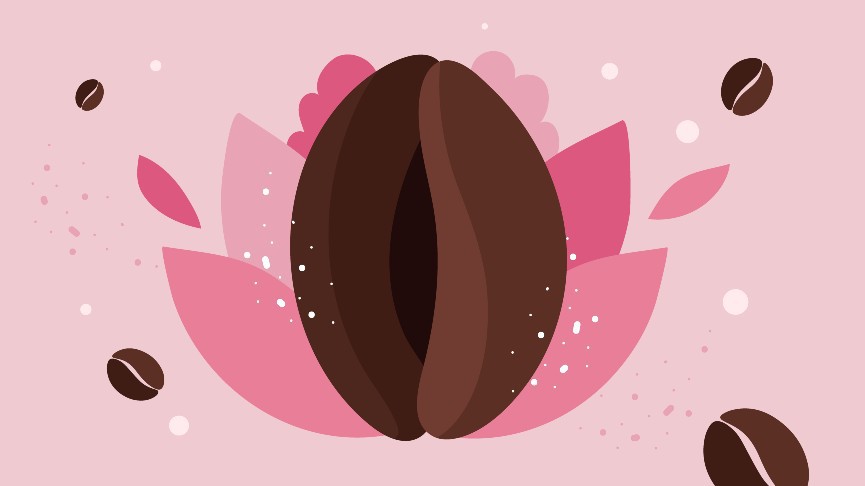Coffee and Reproductive Health

Ahh, that sweet morning cup of joe. An afternoon latte. A post-dinner espresso. There’s no denying the satisfaction one gets from a good cup of coffee.
Of course here at Intimina, we’re focused on reproductive health, and the many things that may impact yours.
So let’s take a deep dive into coffee and caffeine, and how they may interact with your reproductive health.
Coffee and Periods
I hate to be the one to tell you this, but your morning cup may be making your periods more uncomfortable.
Habitual caffeine use increased the correlation with menstrual imbalances, like a prolonged and heavy period, or a long cycle.
Being a diuretic, coffee has been shown to deplete the body’s store of vital minerals, like magnesium. Magnesium is important for menstrual health, helping to balance your mood, and decrease cramps and bloating. Not to mention the dehydration that coffee can cause, which can also increase cramping.
If you’re someone who is prone to PMS, caffeine may increase symptoms of it by increasing your heart rate. It can also add to premenstrual anxiety levels. Although those coffee jitters may help you get through your AM slump at work, they can also add to your before period woes. If this resonates with you, you can try minimizing coffee intake in the week before your period, and note any differences in your symptoms.
Some researchers suggest that caffeine affects the body’s hormone regulation, like estrogen levels, which may in turn affect all aspects of reproductive health – including your periods.
Of course, your nightly dose of zzz’s are essential to a healthy body and mind, avoiding caffeine can help improve sleep. Sleep is essential for overall health, and hormone regulation.
While many of these studies don’t differentiate between coffee and other caffeinated drinks, researchers have found that drinking green tea may significantly reduce painful periods, or dysmenorrhea.
Coffee and Conception
Of course, it doesn’t stop at periods. Coffee may also affect fertility and conception.
Some researchers argue that the reason for a statistical impact of caffeine on fertility is that coffee drinkers may not have as overall healthy habits as non-coffee drinkers. This is a broad stroke assumption, but may give researchers a bit of insight into other compounding variables between drinking coffee and fertility.
Scientists are not totally sure how caffeine affects uterine health, but they have been able to show that it reduces uterine blood flow. Reduced uterine blood supply, may affect embryo implantation, and may even increase the risk of miscarriage.
Another study found that coffee and caffeine consumption may increase the risk of spontaneous abortion or miscarriage.
It’s not just the caffeine in coffee that can affect fertility. Even if your mocha is decaf, coffee is acidic. This acidity affects cervical mucus. When your cervical mucus is too acidic, it becomes hostile for incoming sperm, making conception difficult. This is why many fertility experts recommend going off of coffee when trying to conceive.
Going back to the idea that coffee affects hormone levels, also comes into play when talking about conception. For those having trouble conceiving, finding ways to balance your hormones helps your chances of becoming pregnant. Coffee is possibly a culprit here.
Unless you’re drinking large amounts, coffee is unlikely to impact your fertility significantly. People everywhere drink caffeinated drinks and are still able to have healthy pregnancies. None of these studies are definitive, but hopefully, they offer some insight as to the connection between fertility and coffee consumption.
That being said, if you are struggling with fertility and are a coffee drinker, it is by no means your fault. There may not be a direct link between your caffeine intake and fertility.
This should by no means be taken as medical advice. While it may be helpful to cut out coffee, if you are having difficulty conceiving, you should consult your healthcare provider for more options and information.
You Can Do It!
If you want to.
Giving up coffee is not an easy thing to do. You may be able to minimize some of the side effects, like jitters and anxiety, by waiting to drink it until you’ve had something to eat and drinking smaller amounts than what you’re used to.
You can also try substituting it with a more mild caffeinated drink like green tea or matcha, black tea, or dandelion root tea – which is high in essential minerals.
There are plenty of other mood and energy-boosting supplements you can try that don’t have caffeine in them. Maca, lion’s mane, and chaga, can all help to support and energize you when cutting out coffee.
Of course, we’re not here to tell you to quit drinking coffee, you know your body best. But if you think it may be harmful to your reproductive health, it may be helpful to quit, or at least lessen your intake. Everything in moderation!

Natasha (she/her) is a full-spectrum doula and health+wellness copywriter. Her work focuses on deconstructing the shame, stigma, and barriers people carry around birth, sex, health, and beyond, to help people navigate through their lives with more education and empowerment. You can connect with Natasha on IG @natasha.s.weiss.


